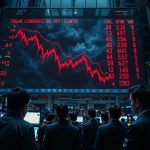Job Security Worries Reach Pandemic-Era Heights
Americans’ concerns about job security have reached levels not seen since the early days of the pandemic, according to recent data. The Federal Reserve Bank of New York’s March Survey of Consumer Expectations revealed that consumers now believe there’s a 44% probability of higher unemployment nationwide a year from now—the highest reading since April 2020.
This growing anxiety about job security comes as many Americans reassess their financial outlook amid economic uncertainties. The survey showed that respondents’ perceived probability of losing their own job in the next 12 months rose to 15.7%, a 12-month high, highlighting widespread concerns about personal job security.
Job Security Perceptions Contrast with Economic Data
Despite these heightened job security worries, actual economic indicators tell a different story. The “hard” economic data continues to demonstrate resilience in the broader economy, with the US job market maintaining solid footing through March. This extends a remarkable four-year streak of employment gains that has helped sustain strong consumer spending and economic growth.
However, economists are increasingly concerned about how these negative job security perceptions might impact consumer behavior. The growing pessimism could potentially lead to reduced consumer spending, which might trigger decreasing business investments and an overall economic slowdown.
Inflation Expectations and Job Security
The New York Fed survey also revealed shifting attitudes about inflation, which may further complicate job security concerns. Near-term inflation expectations jumped significantly—0.5 percentage points to 3.6%, reaching the highest level in 18 months.
Economic analysts have cautioned that the current administration’s aggressive tariff policies and escalating trade tensions could drive consumer prices higher, potentially causing inflation to accelerate again. These price increases could further strain household budgets already concerned about job security.
Long-Term Outlook on Job Security and Inflation
While immediate job security fears have intensified, longer-term inflation expectations appear more stable. The survey showed inflation expectations holding steady at 3% for the three-year horizon and even declining slightly to 2.9% at the five-year mark.
The Federal Reserve closely monitors these expectations since they can become self-fulfilling prophecies. If consumers anticipate higher prices due to job security concerns or other factors, they might increase current spending or demand higher wages—behaviors that could ultimately drive prices higher as businesses pass along increased costs.
Even as job security concerns reach pandemic-era heights, the contrast between pessimistic consumer sentiment and relatively strong employment data presents a complex picture of the American economy’s current state and potential future direction.



